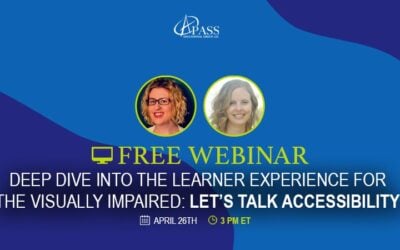Blog
Stay up-to-date on the latest Higher Education, K-12 and Curriculum Design content.
Recent Blogs
SEL Curriculum: The 5 Necessary Elements That School District Leaders Expect
K-12 schools are moving more towards incorporating social and emotional learning (SEL) into their curriculum. The curriculum should include particular elements for the lesson plan materials. These elements ensure that students achieve their outcomes and that teachers rely on efficient and effective instructional materials. As a result, district leaders expect the following five elements in an SEL curriculum. K-12 publishers and providers, therefore, should incorporate these elements as they lead their teams to make instructional products:
Credentialing: Why Higher-Ed Leaders Should Bridge Credit and Non-Credit Courses
College leaders adeptly balance the competing needs of their institution. For years, colleges have held a dual mission: Prep workers for employers and equip students to transfer to four-year institutions for degree obtainment. Nevertheless, these dual missions split into two distinct tracks creating bureaucratic barriers. These walls make moving between obtaining a career-centric certification and a traditional degree difficult for students. Sadly, students of color and at-risk have the most to lose. Still, higher-ed leaders can take steps to bridge the gap between non-credential and credit courses to improve credentialing.
4 Great Ways to Improve Community College Graduation Rates
Staying in college and graduating presents challenges for many students, particularly community college students. According to Think Impact, Inc., a 3.8 billion loss happens each year from college dropouts. Therefore, college leaders for 2-year and 4-year higher-ed institutions must make strides to ensure students become college graduates. Students may come from low-income families and face barriers that traditional students do not face. Thus, college leaders apply these four strategies to help community college students to become college graduates.
The Importance of Building CASEL Curriculum for K-12 SEL
Social and emotional learning (SEL) helps children learn to understand themselves, connect with others, achieve individual and collective goals, and support their communities. Strong SEL skills help students achieve academic success. Also, these skills enhance self-esteem, relationship building, employability, and civic responsibility.
Many educators project that students will need SEL skills for the future. Thus, leaders can help produce materials to address this need. The pandemic and its stresses indicate the need for SEL education. The Collaborative for Academic, Social, and Emotional Learning (CASEL) and Urban Assembly agree that SEL is paramount to community and nationwide civil harmony.
Curriculum Process: 5 points that Higher Ed Leaders Should Know
The curriculum attracts students and engages the surrounding community. However, colleges risk losing new students and opportunities in their community when the curriculum process is slow. Besides that, universities risk missing fresh ideas from faculty when the process is cumbersome. Here are five points higher ed leaders should know.
The 6 Issues That K-12 Publishers Face When Translating Materials
As school districts strive to serve a large community of ELL learners, educational publishers likewise must rise to the challenge. In so doing, K-12 publishers face producing engaging, accurate, consistent, and relevant educational materials. To accomplish this goal, they must be knowledgeable of cultural norms and overcome the barriers, translating for younger audiences. The following are six issues K-12 publishers face when translating educational materials and some strategies for overcoming them.
Webinar: Deep Dive into the Learner Experience for the Visually Impaired: Let’s Talk Accessibility!
Online courses serve a wide variety of learners. Their flexibility to mold to the individual needs of each learner is one of their greatest strengths. In order to meet these individualized needs, courses must be developed with consideration of various accessibility requirements. Creating accessible courses is key to being inclusive of all learners. Join us for an immersive experience as we explore courses and media elements from the perspective of a learner that is visually impaired.
2022 ASU+GSV Conference Notes by A Pass Education
Many great educational conferences happen each year, and one that happened recently was The 2022 ASU-GSV Summit, from April 4th to April 6th in San Diego, CA. Arizona State University and the Global Silicon Valley co-produce the event, held annually. The summit invites innovators, entrepreneurs, educators, and changemakers from around the country to address challenges like educational technology, climate change, and access. The virtual conference was free to attend, and these two sessions provided great information.
6 Amazing Points for College Leaders When Designing Media Literacy Courses
Americans spend on average 12 hours a day consuming media, ranging from television and advertisements to social media and video games. Yet, many people lack media literacy skills to discern fake news from real news. They do not understand how images may affect their emotions or opinions. Since college students are among this group, college leaders can prioritize these 6 components to teach media literacy.
How Higher-Ed Leaders Can Use Microlearning for the Curriculum Process
Well-designed microlearning solves several the curriculum process problems for higher-ed leaders and their teams. Corporate training departments have long embraced microlearning for its perks of retention, mobility, and more. Higher-Ed is beginning to see the benefits of this strategy, too. Still, does microlearning belong in Higher-Ed? Read on for how l higher-ed leaders benefit by using microlearning in their curriculum development process.
5 Top Features Publishers Can Include for Interactive WorkBooks
Many schools have been implementing interactive workbooks. Thus, this change is not just out of necessity. These workbooks present many advantages to both learners and educators. Interactive workbooks are the next innovative development coming out of the digital learning age. Therefore, publishers can include these top 5 features listed below.
Adult Learners: Higher Ed Leaders Consider These Points to Build Online Curriculum
Adult learners who enroll in online courses have unique needs. They often have to balance coursework with full-time employment, family responsibilities, and multiple competing interests. With that in mind, colleges, universities, and adult education publishers can make necessary changes to attract and retain adult learners. Therefore, higher ed leaders should consider the following strategies for building an online college curriculum for adult learners that succeed.












